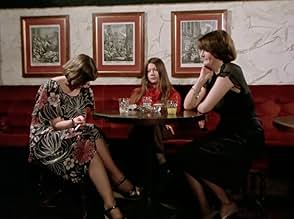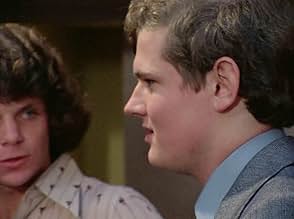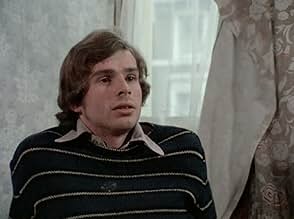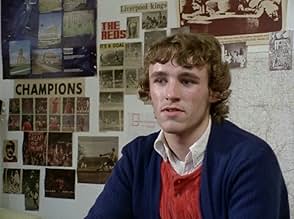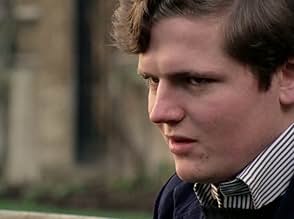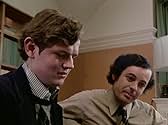21 Up
- TV Movie
- 1977
- 1h 40m
Director Michael Apted interviews the same group of British-born adults after a seven-year wait as to the changes that have occurred in their lives during the last seven years.Director Michael Apted interviews the same group of British-born adults after a seven-year wait as to the changes that have occurred in their lives during the last seven years.Director Michael Apted interviews the same group of British-born adults after a seven-year wait as to the changes that have occurred in their lives during the last seven years.
- Awards
- 1 nomination total
- Self
- (as Bruce)
- Self
- (as Jackie)
- Self
- (as Simon)
- Self
- (as Andrew)
- Self
- (as John)
- Self
- (as Peter)
- Self
- (as Suzanne Lusk)
- Self
- (as Charles)
- Self
- (as Nick)
- Self
- (as Neil)
- Self
- (as Lynn)
- Self
- (as Paul)
- Self
- (as Susan Davis)
- Self
- (as Tony)
- Self - Narrator
- (voice)
- (uncredited)
Featured reviews
At twenty-one, the subjects are now young adults and are naturally more insightful, reflective and, importantly, more articulate. Here, as well, Neil had taken shape as the most compelling figure in the series; he is now melancholic, nervous and poor. And, in this episode, he is bitter when discussing his parents and upbringing. With the other participants, I saw confidence and contentment, especially compared to when they were teenagers, even if they were uncertain of their futures--or chain smoking.
What Michael Apted and the filmmakers did with the film that I especially liked was that they brought the gang together to watch the previous two films and caught their reactions to the films and asked them their thoughts on the series. Generally, it seems, they don't see the importance or purpose of the series; perhaps, they even see it as somewhat of an intrusion. I suppose I wouldn't see the purpose or significance of the first two films, either, without having seen "21" and the subsequent films that aggrandize upon their beginnings; it's the subsequent films that give the previous ones significance. As far removed or alienated as one seems at twenty-one from his seven-year-old self, the Jesuit proverb still holds truth, as Apted discovers.
Early in the film, Neil says that by bringing the group together, the filmmakers might be defeating their original purpose of examining class, or socioeconomic, barriers. And, that focus does seem to be forgotten at times in this addition, although, I suspect, for different reasons. Not only has the series taken on more significance than its initial intent, but also, the interviewees are now more concerned with themselves; even on their pasts, there is more reflection and insight. They're looking inward, planning and thinking about their futures and thus looking forward.
Where we saw the kids in the first Up film become a little more shy and awkward in 7 Plus Seven, this time we see them a little more sure- or perhaps more sure about their uncertainty in life- and Apted focuses on subjects like marriage, careers, ethnic and racial tensions, politics, things covered in the previous segment but without so much emphasis on juxtaposition between clips (not that the flashbacks to previous films aren't useful). The insights are clear and always interesting, and we see how the same kids are still together in this film, or a little more varied (the three boys, for example, do not quite dress or look a like, one clean-cut and the other with long hair).
And, ultimately, we get a sense of what the Up series will evolve into: finding about who these people are by tracking what's happened over time and what they think could happen (or might not) in the future. And in 21 Up it's about coming of age, going through those teenage years into something else, or the same thing as they thought they would be at 7. It's never boring, and we want to see what will happen next or how their view has changed with the passing of time and history around them.
It starts off with the group watching themselves in the first two movies. Of course Apted starts with Nicholas, the scientist in the group. He pontificates and reflects on the past films. I wonder how much the films are affecting these kids. I wonder who dreads the upcoming interviews. I wonder if they try extra hard to look good in these films.
The most compelling are Neil and Suzy. Neil has drop out and working in menial jobs. He's dropping out of society. And Suzy is now fully into her role as the poor little rich girl. We find out that her parents separated soon after '7 Plus Seven'. These kids from the various walks of life is starting to gain colors. And not all the colors are pretty. But Michael Apted is digging deeper now and we're gaining more insights.
Neil of course is the most compelling person to observe and see grow. An extremely sensitive guy, and I don't say that disparagingly. As I already saw "49 Up," I know what happens to Neil and the stuck-up little rich girl (again, I forget her name), so it's all very interesting to see what they were doing at that age.
Onto "28 Up"!
Did you know
- TriviaThe film is included on Roger Ebert's "Great Movies" list.
- Quotes
Andrew Brackfield: Education is very important and you can never be sure of leaving your children any worldly goods, but at least you can be sure that once you've given them a good education that's something that no one can ever take away.
- ConnectionsFeatured in 28 Up (1984)
Details
- Release date
- Country of origin
- Language
- Also known as
- Twenty One Up
- Production company
- See more company credits at IMDbPro


